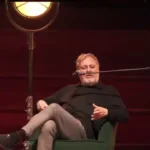
Žižek on Trump: Politics as Hardcore Pornography
Slavoj Žižek recently made a striking comparison between Donald Trump’s political style and hardcore pornography.
Dive deep into history, philosophy, sociology, and the ideas shaping our world.

Slavoj Žižek recently made a striking comparison between Donald Trump’s political style and hardcore pornography.

This comic book issue deals with the current state of mutants after the fall of Krakoa, a time when they are scattered and hated by the world.

If you are struggling with anxiety, the good news is that it is a highly treatable condition, and there are many ways to go about easing its symptoms.

While feeling anxious is a normal part of being human, it can evolve into a disorder when the fear response becomes overly sensitive and all-consuming, ultimately hampering your quality of life.

While the potential symptoms of anxiety are broadly the same for everyone, our unique life experiences can shape our mental health journey and how we are affected.

The symptoms of anxiety can differ greatly from person to person, but they generally fall into three main categories: physical, mental, and behavioral.

Anxiety is a natural human response to feeling uneasy or worried, such as before a job interview or an exam.

A curse is a powerful and malevolent form of magic, essentially a spell or wish intended to bring misfortune and harm to a specific person, family, or place.

Plants have always held a powerful place in human history, serving as sources of medicine, food, and crafting materials.

Ancient Roman society held a deep-seated concern about the use of harmful magic.

In the rich tapestry of Greek mythology, the enchantress Circe stands out as a figure of immense power and mystery.

In ancient Greece, magic was an integral and essential part of everyday existence.

Magic in Japanese culture is deeply woven into religion and folklore, shaped by the traditional Shinto religion.

The story of Empress Chen Jiao from China's Han dynasty is a dramatic tale of love, jealousy, and a desperate turn to forbidden magic.

Magic has a rich and ancient history in Chinese culture, deeply intertwined with philosophy, religion, and tradition.